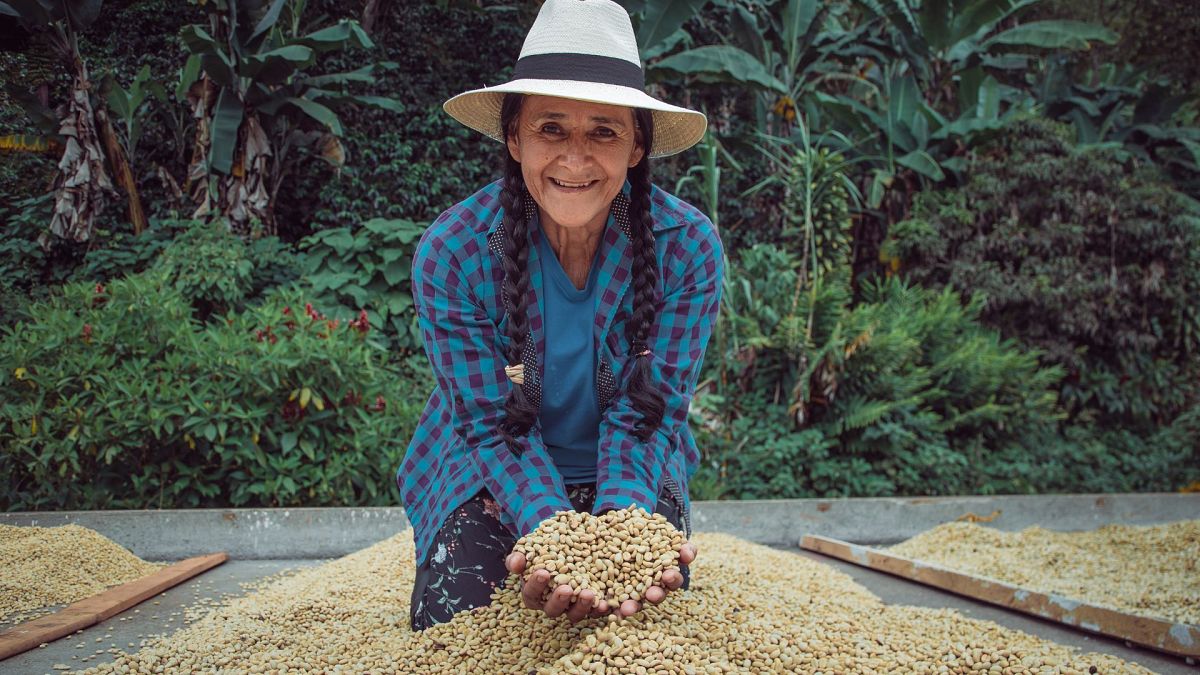Climate change is already affecting Europe’s favourite beverage – but small-scale farmers are working on solutions.
The warming climate and extreme weather are responsible for reduced coffee production, which, in turn, also impacts the quality of coffee beans.
Sourcing experts say that climate change was partly responsible for the global surge in coffee prices in 2024, which has adversely affected smallholder coffee farms.
By 2050, there may be less suitable land for growing coffee. However, farming cooperatives in major coffee-producing countries are fighting back, supported by conscious consumers.
‘If coffee isn’t sustainable for farmers, there won’t be coffee to taste’
“Every year, the rains start later, and the average temperature is higher,” warns Silvia Herrera, a coffee farmer in Chiapas, Mexico.
Elders in her farming community say that it was much easier to grow coffee 25 years ago, Herrera tells Euronews Green.
Meanwhile in Colombia, Fairtrade coffee farmer Jaime Alberto García Flórez has seen temperatures rise so much in recent decades that lower parts of his land have become too hot for growing coffee. He has been forced to replace coffee bushes with cocoa instead.
With changing rainfall and weather patterns, farmers are all too aware that an entire harvest can be lost overnight.
And by 2050, 50 per cent of the global surface area currently used for coffee farming may no longer be suitable, according to a study from the Zurich University of Applied Sciences.
While this is devastating for farmers’ livelihoods, it also affects the millions of Europeans who enjoy a morning cup of coffee.
“If coffee isn’t sustainable for farmers, there won’t be coffee to taste,” Herrera concedes.
Coffee is especially vulnerable to climate change as it’s a “very temperature-sensitive crop”, explains Max Milward, Fairtrade Foundation’s sustainable sourcing manager for coffee.
He adds that not only does “more extreme and unpredictable weather cause more pests and faster-spreading diseases” but that it’s “deepening poverty and inequality” and “threatens farmers’ ability to farm in the future”.
Higher coffee prices create volatility for most farmers
In 2024, the global coffee market experienced a significant surge in prices, caused in large part by adverse weather in several coffee-producing countries.
In Vietnam, a major producer of robusta beans, crops were damaged by prolonged heatwaves, while Brazil – which produces the global lion’s share of arabica beans – had a poor harvest due to heavy rainfall. These events led to a fear of global coffee shortages that caused the prices to soar.
“While higher coffee prices may seem beneficial for coffee farmers, the reality is often very different,” says Milward.
“Sudden price surges, particularly after a contract has been fixed, can cause a huge strain on coffee cooperatives, can lead to contract defaults, fines and of course reputational damage as a result.”
“Also, while farmers may temporarily receive more for their coffee, we know that they’re also dealing with rising production costs, such as labour and inputs like fertilisers,” he adds.
Smallholder coffee farmers are more sustainable than plantations
The coffee industry globally supports 125 million people, and 60 per cent of the world’s coffee is produced on small-scale farms, many of which are family-run in small and remote areas.
“Despite it being a lucrative industry, coffee farmers still don’t enjoy the standard of living that their hard work deserves,” says Milward. “Indeed, very few coffee farmers earn a living income,” he says, adding that this is fundamentally unfair.
For decades, Fairtrade has been working hard to address this inequality and bridge the gap between producer and consumer by selling and promoting products from cooperatives certified with the Fairtrade MARK. This guarantees what Milward calls the “safety net” of the Minimum Price, as well as an additional Fairtrade Premium that provides more working capital and control for coffee-growing communities.
“By supporting small producer organisations through training on quality, productivity, and resource management, farmers can negotiate better terms of trade, reach more markets and also build resilience against market volatility,” explains Miward.
There’s another added advantage to supporting small producer organisations, too.
A recent Fairtrade study in Latin America showed that smallholder coffee farms are more sustainable than large-scale plantations – even though bigger operations are better positioned to adapt and take more risks.
Small farms tend to use less energy as they are often less mechanised and contribute less to deforestation. Fairtrade plays a significant role in supporting farmers by introducing more sustainable practices, such as agroforestry.
But it’s also helping with climate resilience.
When it comes to coffee, climate adaptation and resilience go hand in hand
Flórez is one of 400 farming families within the Red Ecolsierra coffee co-operative in the UNESCO National Park of Sierra Nevada de Santa Marta in Colombia, which focuses on reducing local climate impact.
“Every day, the conservation area on each of the farms is expanded. We’re desperate to do our bit to slow down the effects of climate change,” Flórez explains.
Likewise, Silvia Herrera is a member of the Ejidos San Fernando cooperative, a Fairtrade cooperative that used part of its Fairtrade Premium to build a nursery for coffee plants. This facility is where members test different varieties to see how they perform best both in terms of quality and how they adapt to the changing climate so that crops are more resilient.
They are currently experimenting with 17 crops, and Herrera is hopeful.
“With Fairtrade we have a choice,” Silvia says. “I can produce high-quality coffee, not just focus on producing more and more to feed my family.”

